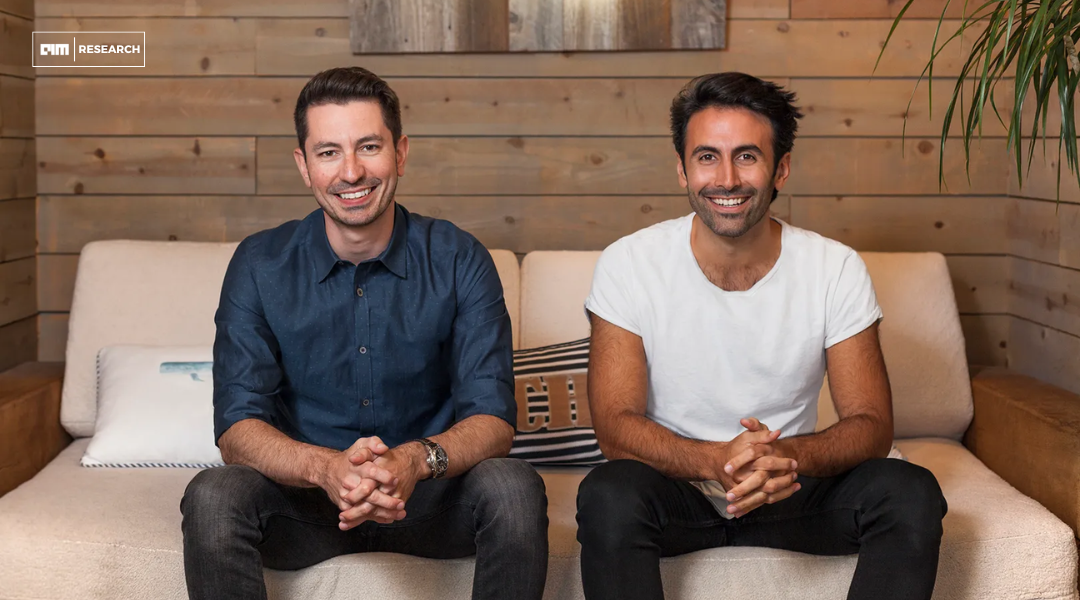

At its best, journaling can surface patterns people don’t notice, help them build self-awareness, and serve as a space for growth. But staying consistent and figuring out what it all means are hurdles. Rosebud, a seed-stage startup founded in 2023, aims to change that. By combining guided prompts with AI-powered reflection, Rosebud is making traditional journaling more of a conversation.
The startup just secured $6 million in seed funding to further develop its product and expand its reach. Founded in 2023 by Chrys Bader, a Y Combinator alum and former co-founder of the once-popular social app Secret, and Sean Dadashi, a cognitive science graduate from UC Berkeley, Rosebud was born out of a shared desire to reimagine mentorship and therapy through technology. The two met at a men’s group and drew inspiration from their experiences with coaching and counseling. Their idea: to create an AI-based companion that could help users explore their thoughts, build healthier habits, and make sense of recurring emotional patterns.
“Everybody is different, and everyone has different languages, not just spoken languages, but different emotional language, different ways of communication,” Bader told TechCrunch. “So one person might want validation and a soft approach, whereas somebody might want the really hard, like, ‘hey, challenge me, call me out on my BS’ approach.”
At its core, Rosebud is an interactive journal that uses large language models (LLMs) to simulate the experience of a personal mentor. Users write entries, ranging from mundane reflections to dream analyses, and receive AI-generated insights, follow-up questions, and guidance. The goal is not to solve problems, but to support users in thinking more deeply. “Rather than trying to replace human thinking, [Rosebud] is trying to help you think more deeply, and feel more deeply,” said Dadashi to Mashable.
The platform’s adoption has been notable. Since launch, users have logged over 500 million words and spent more than 30 million minutes on the app. According to internal survey data, 75% of users reported meaningful improvement in their mental health within 30 days of consistent use.
The seed round was led by Bessemer Venture Partners, with participation from 776, Initialized Capital, Fuel Capital, Avenir, and notable individual investors including Tim Ferriss. “Mental health support shouldn’t be bound by time, place, or privilege. Rosebud is leading the charge in combining AI with long-term memory to become a trusted companion in your pocket – turning self-reflection into growth, and everyday thoughts into lasting transformation,” said Maha Malik, Investor at Bessemer.
Rosebud enters a crowded market of digital journaling apps, competing with offerings like Day One, Reflection, and Journey. But what may differentiate Rosebud is its emphasis on long-term memory and dynamic, conversational journaling. Unlike apps that offer static prompts or mood tracking, Rosebud remembers entries from weeks or months ago, weaving them into a deeper understanding of the user’s mindset. The company refers to this system as its “awareness engine,” built atop Anthropic’s Claude 3.5 Sonnet LLM.
The product also integrates therapist-backed methodologies, drawing on techniques like cognitive behavioral therapy and internal family systems to guide users. Rosebud’s has a library including journals created by mental health professionals, addressing themes like nervous system regulation and positive psychology.
Still, as with any AI-powered tool touching on mental health, Rosebud faces ethical and operational questions. Critics note the potential risks of overdependence and the challenges of responding to users in crisis. The app currently lacks a clinical officer but does work with therapists for feedback and is working to improve how it handles situations involving suicidal ideation. “We recognize the ethical boundaries and limitations in addressing serious mental health conditions,” the founders told Mashable, noting that Rosebud encourages professional support when necessary.
The company maintains that privacy is a top priority. All journal data is encrypted, not used to train AI models, and never sold to third parties. However, as with any cloud-based platform, there are inherent vulnerabilities. Data is briefly stored on the servers of LLM providers, with Rosebud having Zero Data Retention (ZDR) agreements with both OpenAI and Anthropic, to ensure that they handle data in compliance with HIPAA standards and immediately discard data after processing.
With the new funding, Rosebud plans to grow its four-person team, enhance its proprietary memory technology, and expand its feature set. The company also aims to build partnerships with schools, clinics, and employers to make its platform more accessible.
According to Dadashi, the broader ambition is not just about journaling, but rethinking mentorship itself. “What if everybody had something that was looking out for what’s best for them? Or something that’s helping them become their best self?” he asked. “We’re seeing a future where this can be available to everybody in a way that it just wasn’t possible for it to be available before.”
📣 Want to advertise in AIM Research? Book here >

Cypher 2024
21-22 Nov 2024, Santa Clara Convention Center, CA
A Vendor Briefing is a research tool for our industry analysts, and an opportunity for a vendor to present its products, services and business strategies to analysts who cover the vendor specifically or a related technology or market.
AIM Research encourages technology vendors and agencies to brief our team for PeMa Quadrants, when introducing a new product, changing a business model, or forming a partnership, merger, or acquisition.


